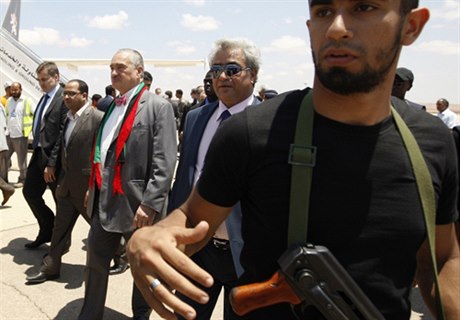The Czech Republic has been singled out as one of the main arms suppliers to repressive regimes in the Middle East and North Africa in a report by the human rights watchdog and campaigner Amnesty International.
Amnesty’s report “Arms transfers to the Middle East and North Africa: Lessons for An Effective Arms Trade Treaty” picks out the Czech Republic alongside France, Germany, Italy, Russia, Britain and the US as main arms suppliers to Bahrain, Egypt, Libya, Syria and Yemen from 2005. It says many western states that are now enthusistically supporting new governments that overthrew oppressive regimes had previously been arming those arming those same regimes.
The report lists the Czech Republic as one of 11 states where military assistance, weapons, munitions or other assistance was given to Yemen. Amnesty pointed out that more than 200 protesters have been killed in Yemen this year. Specifically, the report says the Czech Republic supplied small bore guns worth €2.97 million, ammunition worth €8.38 million, and armored vehicles costing €11.8 million to Yemen between 2007 and 2009.
“Despite the continued brutal crackdown against protesters, the international community has failed to take strong action to stem arms transfers to Yemen,” it added.
Exports to Libya, where a long and bloody uprising against the near 40-year-old regime of Moamer Gaddafi has just ended, comprised armored vehicles costing €1.9 million and toxic agents supplied in 2006 worth €421,000. Deals were done across the region ahead of popular risings this year in some of the countries “despite having evidence of a substantial risk they [the arms] could be used to commit serious human rights violations,” Amnesty said.
The ethical foreign policy has been championed by TOP 09 leader and Foreign Minister Karel Schwarzenberg.
The latest report is likely to be embarrassing in particular for the Czech Republic which has presented itself as a crusader for human rights worldwide whatever the diplomatic costs of such a stand and the offense caused to major powers, such as China and Russia. The ethical foreign policy has been championed by TOP 09 leader and Foreign Minister Karel Schwarzenberg. He has headed the Foreign Ministry from 2007 until mid 2009 and again from July 2010.
The watchdog said its findings highlighted the “stark failure of existing arms export controls” and loopholes in existing regulation and the need to remedy that situation with an effective global arms trade treaty that takes account of human rights.
Previous criticism
Amnesty put the spotlight on the Czech Republic in August 2010 when a 103-page report “Yemen: Cracking Down Under Pressure” also highlighted Czech arms exports. That report also included details of Czech sales of mines, bombs and torpedoes. The Czech Foreign Ministry said at the time that total arms exports to Yemen were small and that export authorizations were carefully scrutinized.
US agencies have highlighted Yemen as one of the biggest possible terrorist threats and argued that the existing tottering government should be supported to help curb that risk.
Shackles
An earlier Amnesty report in March 2010 said that equipment likely to be used for torture, such as electric shock equipment, chemical sprays and shackles were sold to a series of countries with dubious human rights records. These countries included Pakistan, Mongolia and Senegal.
Amnesty is currently seeking to get a meaningful Arms Trade Treaty adopted when countries meet at the United Nations in 2012 to discuss a proposal to draw up new rules and a framework for the business. Opposition to a new treaty has already surfaced from China, Russia, Egypt, China and the US, the human rights organization said, even though provisions of the treaty as currently drafted would fail to clamp down on some of the arms exports that could be used for suppression of popular protests, it said.




